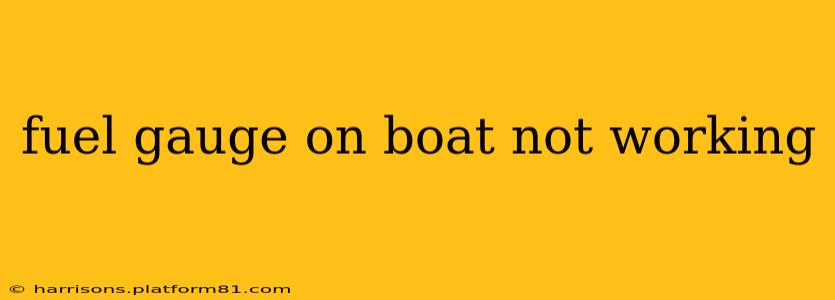A malfunctioning fuel gauge on your boat can be incredibly frustrating and even dangerous. Knowing your fuel level is crucial for safe navigation and avoiding costly breakdowns. This comprehensive guide will walk you through the common causes of a faulty boat fuel gauge and provide solutions to get you back on the water with confidence.
Why Isn't My Boat Fuel Gauge Working?
There are several reasons why your boat's fuel gauge might be malfunctioning. Let's explore the most common culprits:
1. Bad Fuel Sender Unit:
This is often the primary culprit. The fuel sender unit, located in your boat's fuel tank, is a crucial component. It measures the fuel level and sends a signal to your gauge. A faulty sender unit can result in inaccurate readings, a constantly empty reading, or a gauge that fluctuates erratically. Corrosion within the unit, broken wires, or a faulty float are common problems.
2. Wiring Issues:
Problems with the wiring connecting the fuel sender to the gauge are another frequent cause. Corrosion, loose connections, broken wires, or even chafing against the hull can interrupt the electrical signal, leading to an inaccurate or non-functional gauge. Inspect all wiring carefully for any damage.
3. Faulty Fuel Gauge:
While less common than sender unit or wiring issues, the fuel gauge itself can malfunction. If the wiring and sender unit are confirmed to be working correctly, the gauge might need replacement.
4. Grounding Problems:
A poor ground connection can disrupt the electrical circuit, preventing the gauge from receiving the correct signal. This can manifest as an erratic or inaccurate reading. Check for clean and secure grounding connections.
5. Incorrect Installation:
If you've recently had work done on your fuel system, it's possible the fuel sender unit wasn't installed correctly. A misaligned float or incorrectly wired connections can lead to inaccurate readings.
6. Interference:
While less likely, electrical interference from other components in your boat's system could potentially affect the gauge's accuracy.
How Can I Fix a Non-Working Boat Fuel Gauge?
Troubleshooting a non-working fuel gauge requires a systematic approach:
-
Visual Inspection: Start by visually inspecting the fuel sender unit and all associated wiring. Look for any signs of corrosion, damage, or loose connections. Check the wiring connections at both the sender and the gauge.
-
Testing the Fuel Sender Unit: This often requires removing the unit from the tank. You'll need a multimeter to test the resistance of the sender at various fuel levels. Consult your boat's manual or a wiring diagram for specific instructions. Caution: Always disconnect the battery's negative terminal before working on any electrical components.
-
Checking Wiring Continuity: Use a multimeter to test the continuity of the wiring between the sender and the gauge. This will confirm whether there are any breaks in the circuit.
-
Checking Ground Connections: Ensure all grounding points are clean and secure. A loose or corroded ground can significantly affect the signal.
-
Testing the Gauge: If the sender unit and wiring are functioning correctly, the gauge itself might be faulty and require replacement.
What if I need to replace parts?
If your troubleshooting reveals a faulty sender unit, wiring, or gauge, replacement will be necessary. You'll need the correct replacement part for your specific boat model. Obtain this from a reputable marine parts supplier or your boat's dealer. Remember, proper installation is crucial to ensure accuracy and avoid further damage.
Can I just estimate my fuel level?
While you might be tempted to simply estimate your fuel level, relying on guesswork is dangerous. Accurate fuel gauging is vital for safety and avoiding costly breakdowns. A non-functional gauge should be repaired or replaced as soon as possible.
This comprehensive guide provides a detailed approach to troubleshooting a non-working boat fuel gauge. Remember safety precautions, and if you're not comfortable tackling this yourself, consult a qualified marine mechanic. Regular maintenance and inspections of your boat's fuel system will help prevent future problems.
